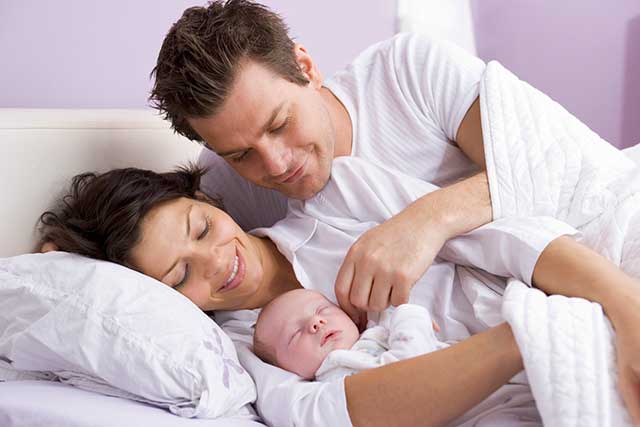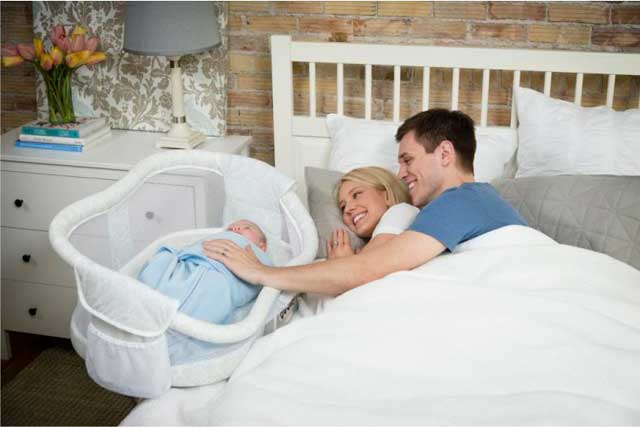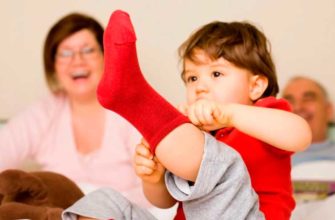The appearance in the house of the child is a long-awaited event. There he lies next to you, yawns sweetly, fingering with tiny fingers and squinting. This means it's time to go to bed. In the children's room or in the parent bedroom, a cozy bed is already prepared for the child. It remains to put it in this small nest and be touched by the sight of a sniffling baby. True, after a few hours the crumbs will have to get out to feed. Then you will need to do it again and again - and so on all night long ... Maybe just put the baby next to you? And then suddenly it will not work to wean the child to sleep with parents? We will help you find the answers to these questions.

Is there a sleep compatibility issue?
The problem of joint sleep has long been the subject of heated debate between parents, psychologists and pediatricians. Each leads many arguments, defending their position, there is still no unequivocal opinion. However, as with any issue that relates to raising a child. Nevertheless, there are facts and comments of experts that will help you weigh the pros and cons, and then make your own decision.
How useful is a joint sleep with a child?
The first and main argument in favor of sharing sleep with the baby is to establish a long and successful breastfeeding. Each child is naturally programmed to sleep with his mother and actively sucking at night. And a woman is arranged in such a way that it is at night when the baby is breastfeeding that her body reaches the maximum level of prolactin - a hormone that promotes the production of milk. Tactile contact with the child stimulates all these processes. In addition, the mother will not have to periodically jump out of bed to run up to the baby if they sleep together. As a result, a woman will feel better, will become less irritable, and this will immediately affect the baby. Moms who sleep with their children from the first days cannot even understand those who complain of lack of sleep, and they often don’t remember whether they woke up at all.
We also read: the benefits of overnight breastfeeding
Sleeping together helps regulate security issues, although this may seem strange. Recent studies show that this reduces the risk of sudden infant death syndrome. When the baby lies next to his mother, his sleep becomes less deep, superficial. Opponents of shared sleep see this as a flaw. However for children under the age of 6 months, superficial sleep is beneficial: it’s easier to wake up and, therefore, easier to “call for help”, to signal that something is not in order. The presence of a mother nearby generates mutual sensitivity and facilitates awakening. This is a protective measure in case of respiratory failure. In addition, joint sleep forms a stable sense of security in the baby. So, in confidence, the confidence in the world around us grows, and most importantly, in our own mother.
Often babies do not have enough touch of the mother while awake. He can also get the necessary caress during a joint sleep. This will provide favorable conditions for the grown-up child to feed, because in the afternoon the baby can play too much and as if “forget” to eat. In the future, it is nightly feeding that allows the mother, for example, to go to work, or to leave for a long time, without worrying that her child will not finish eating.
If you still decide to sleep with your child, the following rules will help you overcome your fears and resolve doubts:
- Never Do not put the crumbs near if you have drunk alcohol or are under the influence of other stimulants. An altered state of consciousness will not allow you to help the child if he suddenly needs it.
- If the baby is lying on an adult mattress, be sure to choose a solid model, and lay the child on his back or on his side. According to recent studies, these are the safest poses for crumbs.
- A potential threat to the baby in the parent's bed is pillows, rollers, water mattresses, as well as the gap between the bed and the wall.
- The heat of your body is an additional heating for the child. To avoid overheating, use a minimum of warm nightwear, bedspreads and blankets.
- Make sure that the baby can still sleep on his own, so that sleep in a separate bed does not seem to him a punishment.
- Let the baby understand that he can sleep with his mother, and wait until he adapts to this.
- To learn how to conveniently feed while lying in bedYou should talk with breastfeeding counselors. You can also consult with other women who already have experience with sleeping together and breastfeeding, preferably several babies.
- Remember that a dream with a baby should not create a discomfort for mom.
The ideal situation is if mom rests when she sleeps with the baby. If this does not work out, you probably have to think about a solution to this issue.

Problems in children sleeping in parental bed
A joint dream with a baby solves many problems, but it also causes certain problems. According to some experts, this can cause sleep disorders in the crumbs. According to studies, such disorders develop in 50% of children from the age of six months to 4 years, sleeping in parental bed. At the same time, only 15% of babies who sleep separately worry about sleep problems. There is a hypothesis that if a child sleeps with his parents, he cannot learn to fall asleep on his own, and this is an important skill for independent living.
If the baby sleeps with his mother, he develops the habit of sucking breasts throughout the night. Some authors of educational manuals claim that this can provoke caries: with almost continuous feeding, milk is constantly present in the baby’s mouth, which destroys tooth enamel. This risk is increased if the baby continues to breastfeed in the second year of life. The logical question is: what, after daily feeding, does the baby brush his teeth? So before you adopt this argument - consult with a pediatric dentist.
The urgent issue is the intimate relationship of parents. Even the presence of a child in the room imposes restrictions, what can we say about sharing a dream with the baby. This problem is not easy to cope with, but still there is a solution. For the duration of sexual relations, you can put the baby in the crib. Another option is to go to another room.
Sleeping with an infant or even with a small child is one thing. But how to explain to a grown-up child, accustomed to a parental bed, that from now on he should move to his separate bed?
If a child is accustomed from birth to sharing a dream with his mother, then he should be weaned from this gradually, starting from the age of 1.5-2 years. It is good if the baby will sleep separately in the morning and in the afternoon. Therefore, it is worth getting a crib or cradle for a child. All people need personal space, including the baby - for the development of individuality and independence skills. When it is time for the child to completely move into his crib, this can be turned into a beautiful and joyful holiday. In such an environment, the baby will appreciate that it acquires its “center of independence" as evidence of love and respect for those close to his personality.
We also read: We teach a child to sleep in his crib separately from his mother (video, real stories)
There is room for compromise on the issue of shared sleep. For example, parents can take their baby to their bed only occasionally: when the child is sick, he is afraid of a nightmare, and also in the morning or on a day off. A compromise option is to place the crib with the front panel removed, close to the parents' bed. So you do not have to jump up when the baby cries - you can calm and feed him without rising. Yes, and the baby does not embarrass parents, being on its territory. Some simply push the crib closer to their bed - so you can touch the child at night, grab it by the handle, lull it.
We also read: Baby is always there - extra beds for newborns

Sleeping together or not - how to make the right decision?
In Australia, scientists conducted a study of the behavior of babies and got amusing results. It turns out babies themselves let parents understand how and where they want to sleep - you just need to take a closer look at their behavior and reactions. Australian scientists argue that all babies are divided into three types: one sleeps better in a separate room, others need the presence of parents, and the third must be in the parent's bed.
It is difficult to compare with something the pleasure that parents receive from the fact that their little one sniffs sweetly. Nevertheless, even those who sleep separately from children may well feel the spirit of family unity - for this it is enough to bring the baby to their bed in the morning to feed him or play with him.
[sc name = ”rsa”]
In any case, it is important for parents to decide on a place for their child to sleep during the first year of his life. The baby will be able to adapt to sleep alone or with her parents. However, after the formation of this habit, changing it will already be much more difficult.
If you and your little one like to sleep together, or you think it is necessary, trust your intuition and do not listen to anyone else's advice. Especially if the baby is nursing - at this time a joint sleep is very convenient. Do what you think is right, and not anyone else.
Another thing is if you do not want the child to sleep with you. For example, it breaks the harmony between you and your spouse or you have several children. In such cases, you need to try to organize a night's sleep in a way that will be most convenient for all households.
We also read:
- The baby is sleeping with mom. Danger or not
- Mom's experience: the baby must sleep separately!
- A joint dream with a child. Benefit or harm
Joint sleep: the opinion of the pediatrician
Mom's opinion









I have not met a single mom who would have enough sleep during a sleep with a child. Therefore, having such an experience with the first daughter, from birth, the little son was put to sleep only in a crib. So during sleep both had a rest and there was no problem with weaning from the parental bed.
In the same way, one can answer that not a single Mom has met, who would have got enough sleep, getting up five times at night to feed the baby if he sleeps in the crib. And if the baby wakes up in Mom’s arms, the mother needs to lull him, put him to bed, and he wakes up again. And how in this case to sleep. Because of this, many quickly quit breastfeeding. And if mom also has back problems, what bed ????? Ideal for breastfeeding mothers to sleep with her baby at night. Another question - do not forget about dad !!!!
I don’t know who how, but when I put my baby to sleep in his crib, then I didn’t get enough sleep. It was very difficult for me to jump up many times, because he didn’t want to sleep there, he had to rock it all night so that he could sleep a little, and if he fell asleep, then he would not always hear him crying and then walked barely alive. And when I started sleeping with the baby - then I started to get enough sleep. I don’t know how anyone, but I like to sleep with the baby, and he falls asleep well beside me. So how many people - so many opinions
I believe that a child should have its own place to sleep from the very beginning. In the first weeks, anything can happen; he can spend several nights in his parent's bed. but he and the parents must understand that this is temporary, for a couple of hours, until he falls asleep, and then the child should again be in his crib, which should also gradually move farther and farther from the parents' bed.
I am a lazy mom. It took weeks after the maternity hospital to understand a simple thing: getting up several times a night to feed the baby and then jumping up to check if he was breathing, if his nose was buried in the blanket, it was impossible to be awake in the morning. Therefore, I am with arms and legs for a joint sleep. I get enough sleep with the child, and he is calmer from the fact that his mother is nearby.